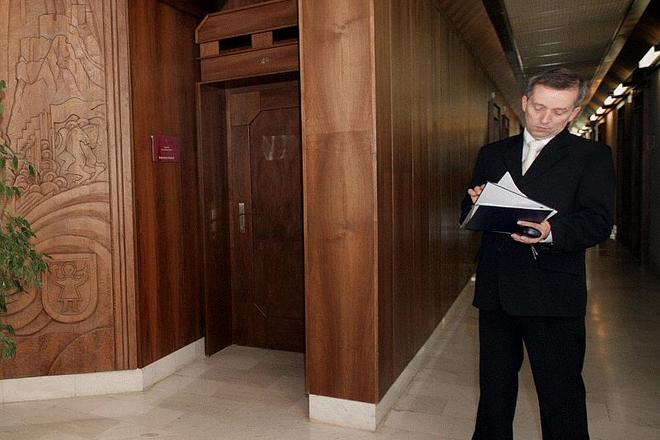The ruling coalition entered 2011 with the question of who would become Slovakia’s next general prosecutor still unresolved. The term of the incumbent, Dobroslav Trnka, expired in February 2011, but it took until June for MPs to finally agree on his replacement: Jozef Čentéš. However, President Gašparoviè has so far refused to appoint Čentéš, despite a Constitutional Court ruling in October that he had been chosen using a constitutional procedure. Trnka’s former deputy, Ladislav Tichý, is currently the acting general prosecutor, with Trnka now acting as one of his senior lieutenants.
The ruling coalition had serious problems in late 2010 agreeing on a joint candidate for the position – Čentéš was their eventual choice – and then getting him elected via a secret ballot. A parliamentary vote on December 2, 2010 ended with several coalition MPs voting anonymously with the opposition, almost bringing down the government in the process.
In a ballot on May 17 this year, a re-run of the December 2 vote, Trnka, the only candidate, won the support of 70 of the 150 deputies present. A simple majority of all 150 MPs present – i.e. 76 – would have been necessary to secure his victory. By rejecting Trnka, ruling coalition MPs apparently heeded a threat by Prime Minister Iveta Radičová to resign if Trnka, about whom she had expressed strong reservations, were to prevail.
The re-run was a secret ballot, held after the Constitutional Court ruled on April 20 that Trnka’s constitutional rights had been violated during the two 2010 votes, when deputies revealed how they had voted, by photographing their ballots or openly declaring whom they had supported. By doing so, the court found the deputies violated the basic principles of the secret ballot and thus Trnka’s rights.
The ruling coalition then went to considerable lengths to change the rules so as to make the vote by MPs public. In May 2011 parliament voted to change its own rules in order to allow a recorded vote rather than a secret ballot to be used to select the general prosecutor, but Tichý and a group of 35 Smer MPs challenged the modification.
As it transpired, Čentéš was eventually selected by a secret ballot on June 17 to serve a seven-year term. The coalition chose this method to avoid complications in the event that the Constitutional Court were to later rule that the open ballot method was unconstitutional. Čentéš received 79 votes from the 80 lawmakers present, with Smer MPs boycotting the parliamentary session.
Trnka had by then withdrawn his name from the vote, but he also later challenged that vote, arguing that parliament had not respected an initial ruling of the Constitutional Court that another vote to select a general prosecutor should not be held until the court had decided on the merits of the case before it: specifically, whether parliament had the constitutional authority to change the voting method from a secret ballot to a public, recorded vote.
In July Trnka sought redress from the Constitutional Court, claiming that his right to equal access to be re-elected as general prosecutor had been violated on May 17 and that the results of the vote had been incorrectly tabulated and that parliament should have declared him the winner of that vote and submitted his name to the president for re-appointment.
President Ivan Gašparoviè initially cited the appeal by Tichý and the Smer MPs to the Constitutional Court as his reason for refusing to appoint Čentéš. But he did not appoint Čentéš even after the Constitutional Court ruled in October 2011 that both public and secret ballots were constitutionally valid methods for selecting the general prosecutor.
In response to that ruling, Čentéš in October 2011 filed a complaint with the Constitutional Court claiming that his rights had been violated by the president’s failure to appoint him in a timely manner.
As 2011 ended, Čentéš was still waiting to be appointed. When the government fell in October, the president commented that the issue of his appointment was “of tertiary importance” to him.
The general prosecutor vote, however, was not the only issue on which the Constitutional Court was asked to give an opinion on prosecution- related issues. An amendment to the law on the prosecution service, passed by parliament in June, which the Justice Ministry says will make the work of prosecutors and prosecutors’ offices more transparent, will not take effect as planned after the Constitutional Court ruled on September 27 that it was suspending its application following a complaint submitted by acting general prosecutor Tichý, who claimed that the changes would politicise the work of prosecutors.
The June amendment to the law required, among other changes, that prosecutors publish their decisions on the internet and that a person could not serve as general prosecutor for more than one seven-year term. The amendment also required that new prosecutors would henceforth be appointed by a six-member selection committee. This committee would have reviewed candidates instead of them being appointed by the general prosecutor, as is currently the case. The amendment specified that the selection committee would consist of three members chosen by parliament and three members chosen by prosecutors’ offices. The court’s ruling was in response to Tichý’s multiple objections to the changes initiated by the amendment, including the new selection procedure.
Another top stories of 2011:
The government collapses and early elections are announced
Judiciary undergoes changes
Minister sacked over wiretapping scandal
Corruption still in focus
Troubled deals




 Jozef Čentéš is still waiting for his appointment (source: SME)
Jozef Čentéš is still waiting for his appointment (source: SME)